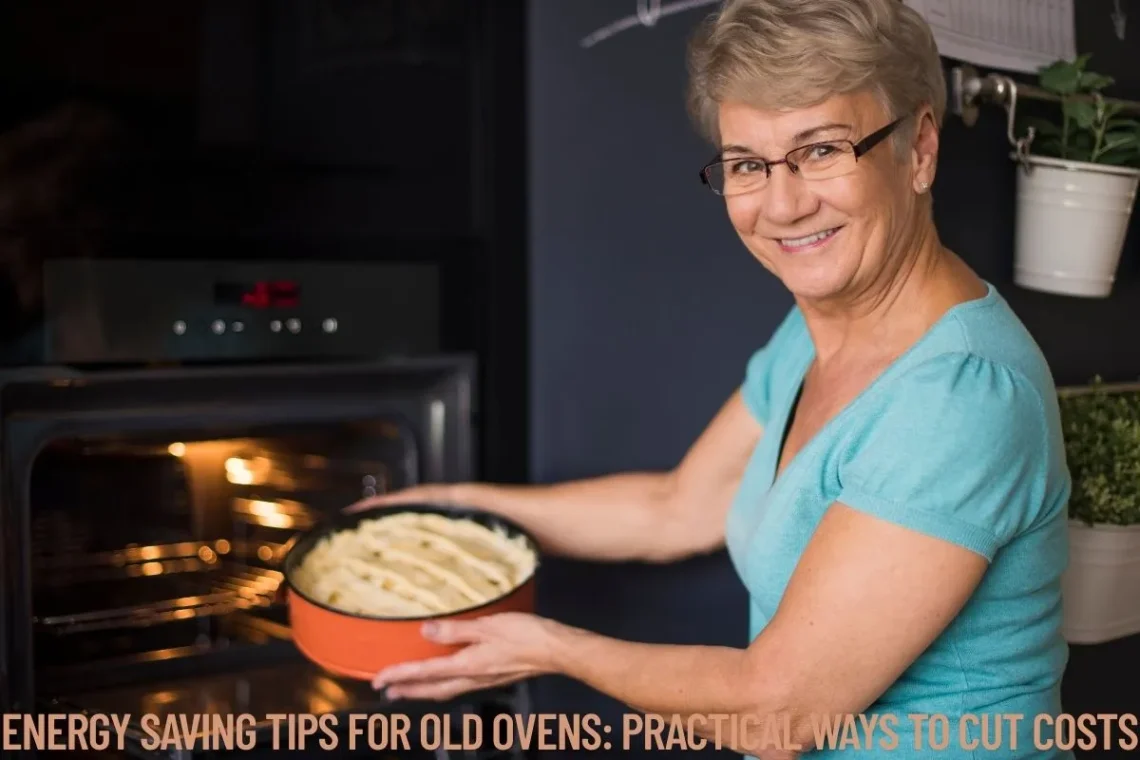
Energy Saving Tips for Old Ovens: Practical Ways to Cut Costs
Owning an older oven can feel like owning a loyal but slightly stubborn friend. It works well, but you know it’s not as efficient as the shiny new models in the store. Many people believe the only way to save on energy bills is to replace their oven altogether. But that isn’t true. With a few clever adjustments and habits, you can make even an older oven much more energy-friendly.
I grew up in a home where the oven was used almost daily, and it was far from modern. My mother always had little tricks to save energy—like cooking multiple dishes at once or turning off the oven a few minutes before the food was fully done to let the residual heat finish the job. These simple habits not only cut down bills but also extend the oven’s life.
This guide will show you real, practical ways to save energy with your older oven while still enjoying great meals.
Table of Contents
ToggleHow to Save Energy with an Oven?
Even if your oven is more than ten years old, you can still reduce how much electricity or gas it uses. Here are some tried-and-tested strategies:
1. Preheat Only When Necessary
Many of us automatically preheat the oven, even when it’s not needed. For foods like casseroles, vegetables, or reheated meals, preheating isn’t essential. Skipping this step saves both time and energy.
2. Cook More at Once
An old oven uses the same amount of energy whether you bake one tray of cookies or three. If possible, plan meals in batches. When I was in college, I’d bake chicken for the week along with a tray of roasted veggies in one go. This saved me from running the oven multiple times.
3. Use the Right-Sized Cookware
A small dish in a huge oven wastes energy. Try to match cookware to your oven’s size. Glass or ceramic dishes also retain heat better, so food cooks faster.
4. Avoid Opening the Door Too Often
Every time you peek inside, the temperature can drop by up to 25°C (about 50°F). The oven then works harder to get back up to heat. Instead, use the oven light or a timer to check progress.
5. Use Residual Heat
Turn the oven off about 5–10 minutes before your dish is finished. The stored heat is usually enough to complete the cooking. This trick was a favorite of my grandmother’s, and her cakes always came out perfect.
How Can I Reduce My Oven Power Consumption?
Older ovens aren’t built with energy efficiency in mind. But small tweaks in usage can make a huge difference.
Clean Your Oven Regularly
Grease and burnt food make your oven less efficient. A clean oven reflects heat better, so food cooks faster. You don’t need harsh chemicals—baking soda and vinegar work well.
Check the Door Seal
If the door doesn’t close tightly, heat escapes. That means your oven has to run longer to maintain temperature. Replacing a worn-out gasket is inexpensive but can save a lot in energy bills.
Cook Smart with Convection (If Available)
Some older ovens have a convection setting. This circulates hot air, making food cook faster and more evenly. If your oven has it, use it—it can reduce cooking time by up to 20%.
Use Smaller Appliances When Possible
For small tasks, like reheating leftovers or baking a potato, a toaster oven or microwave may be more efficient. Think of it like using a scooter for a short trip instead of a car.
Do Older Ovens Use More Electricity?
Yes, in most cases. Older ovens are less insulated and lack modern features like self-regulating temperature sensors. That means they need more energy to maintain heat.
However, this doesn’t mean you need to throw yours out right away. Many households around the world still rely on ovens that are 10, 15, or even 20 years old. With good habits, they can run nearly as efficiently as mid-range newer models.
When I moved into my first apartment, the oven was easily 15 years old. My electricity bill jumped during the first month. But after I started using batch cooking, avoided preheating unless required, and kept the oven spotless, I noticed my bill dropped by almost 20%.
What Are 7 Ways to Reduce Consumption of Energy?
Here’s a simple list of seven ways you can cut energy use with your oven:
-
Cook multiple dishes together – Maximize one heating cycle.
-
Use the oven light instead of opening the door – Keep heat inside.
-
Choose glass or ceramic cookware – Retains heat better.
-
Turn off the oven early – Let residual heat finish cooking.
-
Keep it clean and maintain door seals – Prevents wasted energy.
-
Use smaller appliances when practical – Microwaves or toaster ovens for quick jobs.
-
Plan meals ahead – Reduces unnecessary reheating and wasted oven cycles.
Personal Tips from Daily Life
One of the biggest lessons I learned from living with older appliances is that planning is key. If I was baking bread, I’d throw in a tray of sweet potatoes at the same time. If I roasted chicken, I’d also bake muffins for the week ahead. These little adjustments didn’t just save energy—they made me feel more organized.
Another personal trick I still use today is keeping the oven door open after cooking in winter. The leftover warmth gently heats up the kitchen. Of course, if you have kids or pets, you need to be careful with this one.
Smart Habits That Make a Big Difference
Sometimes it’s not about big changes but the small daily habits that add up. Think about how many times you turn your oven on in a week. If you can cut that number by just two or three, you’ll see real savings.
For example, I used to bake a small pizza on Friday nights and then bake cookies on Saturday. One day I realized I could just make both on Friday, using one preheated cycle. That one little switch saved about half an hour of electricity each week. Multiply that by months, and you’ll notice a drop in your bill.
Grouping Meals Like a Pro
If you know you’ll roast vegetables, plan to bake bread right after. The oven is already hot, so you don’t waste the energy of preheating all over again. It feels like you’re “stacking” energy savings.
Using Temperature Wisely
Older ovens don’t always hold temperature perfectly, but you can use that to your advantage.
-
Lower the Temperature Slightly: Many recipes can be cooked 10–15 degrees lower if you allow a few more minutes of cooking time.
-
Know Your Hot Spots: My old oven had a hotter back corner. Once I learned that, I placed denser foods like lasagna there so they’d cook evenly without running the oven longer.
Think of your oven like a personality—you get to know its quirks and cook smarter around them.
Do Oven Accessories Help Save Energy?
Yes, surprisingly! A few small tools can help your older oven perform better:
-
Oven Thermometer: Old ovens often run hotter or cooler than the dial says. By knowing the true temperature, you avoid unnecessary extra minutes of cooking.
-
Pizza Stone or Baking Stone: This stores heat, so your oven doesn’t cycle on as much. It’s great for breads, pizzas, and even cookies.
-
Good Cookware: As mentioned earlier, glass or ceramic dishes are best, but heavy-duty baking trays can also help distribute heat evenly.
I once invested in a simple oven thermometer for under $10, and it changed my cooking. I discovered my oven ran 25°F cooler than the dial suggested. No wonder my cakes always sank! Once I adjusted, they cooked faster and more evenly—less wasted energy and no more ruined bakes.
Seasonal Energy-Saving Oven Tips
How you use your oven can also depend on the season.
-
In Winter: After cooking, leave the oven door open slightly to let the residual heat warm your kitchen. My parents used to do this, and the whole room would feel cozy without turning on the heater.
-
In Summer: Do the opposite—keep the oven door shut tight and use it less often. Otherwise, your air conditioner will work harder. In hot months, I switch to stove-top or outdoor grilling more often to save electricity.
Do Ovens Waste Energy When Idle?
Here’s something many people don’t think about: phantom power. Some ovens with digital clocks, lights, or timers consume a little electricity even when not in use. While it’s not a huge amount, unplugging your oven during long holidays or using a power strip can shave off a few dollars per year. It’s like switching off unused chargers—it all adds up.
Family-Friendly Tips
If you have kids or live with family members, energy-saving becomes a team effort. A simple household rule like “no opening the oven door unless necessary” can save both time and energy.
In my home, my younger brother loved peeking into the oven when cookies were baking. My mother solved this by giving him the oven light “job.” He got to flip the switch and check without opening the door. It became a little ritual—and it saved us from heat loss.
When Is It Time to Replace Your Old Oven?
While the goal here is to save energy with your current oven, sometimes replacement is the smarter move. Signs it may be time:
-
The oven struggles to hold temperature no matter what.
-
The heating elements wear out frequently.
-
Energy bills remain high even with efficient habits.
Newer ovens, especially convection or smart ovens, use up to 30% less energy. That said, not everyone wants to invest in one right away. Think of energy-saving habits as a bridge—helping you save until you’re ready to upgrade.
A Greener Way of Thinking
What I love about energy-saving with old ovens is that it’s not just about bills—it’s about respect for what we already have. Too often, we rush to replace appliances when small changes could make them last longer. Using less energy also means reducing carbon emissions, so every small adjustment helps the environment.
Cooking smarter becomes a little act of sustainability. You get the double reward of lower bills and knowing you’re being kinder to the planet.
Expanded Final Thoughts
An old oven doesn’t need to be a burden. With mindful habits—like cooking multiple dishes at once, using the right cookware, and avoiding heat loss—you can stretch its efficiency further than you’d expect. Add in seasonal tricks, family teamwork, and maybe a couple of affordable accessories, and suddenly that old oven feels like a reliable partner again.
Energy-saving is less about having the newest technology and more about building habits that stick. And once you master them, you’ll find these habits spill over into other parts of life too—planning meals better, wasting less food, and creating a more intentional home.
So the next time you turn on your oven, think of it as an opportunity: not just to cook something delicious, but to save energy, money, and a little piece of the planet as well.
Final Thoughts
Old ovens may not be the most efficient appliances, but they can still serve you well without draining your energy budget. The key is to use them smartly: cook more at once, minimize preheating, keep them clean, and take advantage of residual heat.
Instead of rushing to replace your oven, try these practical tips. Not only will your bills be lighter, but you’ll also feel good knowing you’re making your old appliance work at its best.
Energy-saving isn’t just about technology—it’s about habits. And the best part is, these habits don’t just save money; they make daily cooking simpler and more rewarding.
You May Also Like

How to Choose the Right Wardrobe Depth for Small and Large Spaces
December 3, 2025
How to Grow and Care for Pothos: The Ultimate Guide
June 30, 2025

